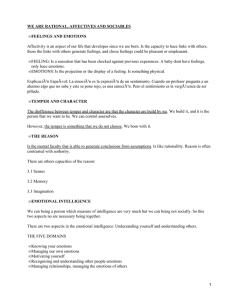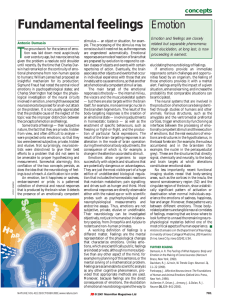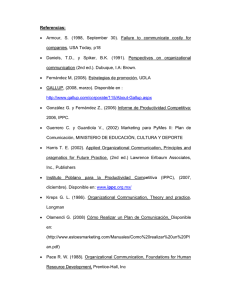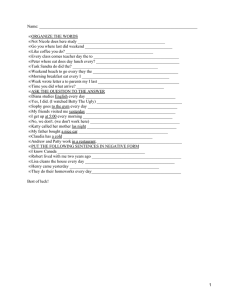Untitled - Sciences Po
Anuncio
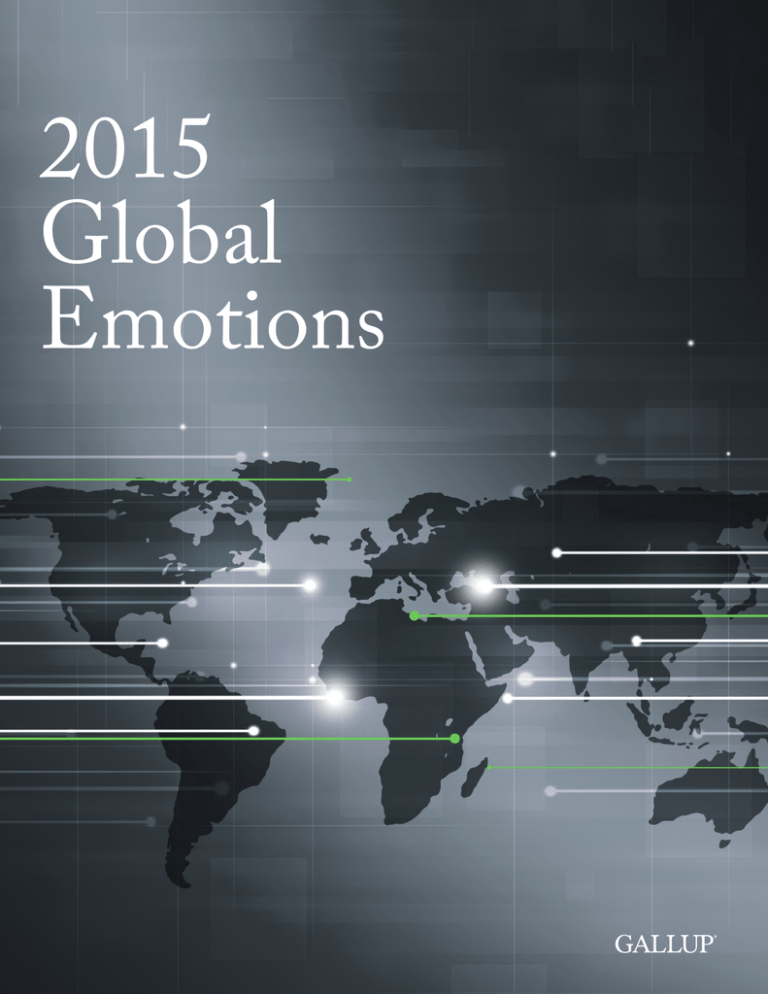
2015 Global Emotions 1 Gallup’s Positive and Negative Experience Indexes measure life’s intangibles — the feelings and emotions that traditional economic indicators such as GDP were never intended to capture. Each index provides a real-time snapshot of people’s daily experiences, offering leaders insights into the health of their societies that they cannot gather from GDP measures alone. The 2015 Global Emotions report presents the results from Gallup’s latest measurements of people’s positive and negative daily experiences, based on nearly 153,000 interviews with adults in 148 countries in 2014. POSITIVE EXPERIENCE INDEX The Positive Experience Index score is the mean of all valid affirmative responses to these items. Country-level index scores range from zero to 100. Higher scores mean that positive emotions are more pervasive in a country. These scores strongly relate to people’s perceptions about their living standards, their personal freedoms and the presence of social networks. •• Did you feel well-rested yesterday? •• Were you treated with respect all day yesterday? •• Did you smile or laugh a lot yesterday? •• Did you learn or do something interesting yesterday? •• Did you experience the following feelings during a lot of the day yesterday? How about enjoyment? NEGATIVE EXPERIENCE INDEX The Negative Experience Index score is the mean of all valid affirmative responses to these items. Country-level index scores range from zero to 100. The higher the score, the more pervasive negative emotions are in a country. People’s experiences with health problems and their ability to afford food are predictive of higher negative scores. •• Did you experience the following feelings during a lot of the day yesterday? How about physical pain? •• Did you experience the following feelings during a lot of the day yesterday? How about worry? •• Did you experience the following feelings during a lot of the day yesterday? How about sadness? •• Did you experience the following feelings during a lot of the day yesterday? How about stress? •• Did you experience the following feelings during a lot of the day yesterday? How about anger? Copyright © 2015 Gallup, Inc. All rights reserved. 2015 GLOBAL EMOTIONS 2 2014 Positive Experience Index Worldwide Lowest score, 47 Highest score, 89 POSITIVE EXPERIENCE INDEX STABLE WORLDWIDE IN 2014 Gallup asked adults in 148 countries in 2014 if they had five specific positive experiences on the day before the survey. More than 70% of people worldwide said they experienced a lot of enjoyment, smiled or laughed a lot, felt well-rested and felt treated with respect. Additionally, 50% of people said they learned or did something interesting the day before the interview. Gallup compiles the “yes” responses from these five questions into a Positive Experience Index score for each country. The index score for the world in 2014 was 71. This score has remained remarkably consistent through the years. Scores worldwide range from a high of 89 in Paraguay to a low of 47 in Sudan. 2015 GLOBAL EMOTIONS Copyright © 2015 Gallup, Inc. All rights reserved. 3 LATIN AMERICAN COUNTRIES TOP LIST OF POSITIVE EXPERIENCES People in Latin America are the most likely in the world Highest Positive Experience Lowest Positive Experience to experience a lot of positive Index Scores Index Scores 2014 2014 emotions on a daily basis. In fact, for the first time in Paraguay 89 Sudan 47 Gallup’s 10-year history of Colombia 84 Tunisia 52 global tracking, all of the top Ecuador 84 Bangladesh 54 10 countries with the highest Guatemala 84 Serbia 54 Positive Experience Index scores Honduras 82 Turkey 54 are in Latin America. Panama 82 Afghanistan 55 That so many people report Venezuela 82 Bosnia and Herzegovina 55 experiencing positive emotions Costa Rica 81 Georgia 55 in Latin America at least partly reflects the cultural tendency El Salvador 81 Lithuania 55 in the region to focus on the Nicaragua 81 Nepal 55 positives in life. In fact, the single variable that predicts results on both the Positive and Negative Experience Indexes is country of origin, suggesting cultural bias exists in how people answer these questions. COUNTRIES IN CONFLICT POST SOME OF THE LOWEST POSITIVE EXPERIENCE INDEX SCORES Personal freedoms and the presence of social networks are also highly predictive of scores on the Positive Experience Index. The latter helps to explain why people from poor countries in Latin America still seem to live such positive lives. This relationship also helps explain some of the countries at the bottom of the list. Conflict-plagued Sudan had the lowest Positive Experience Index score in the world in 2014, and several other countries at the bottom of the list were in turmoil or transition last year. Conflict-ridden South Sudan and Ukraine and Ebola-stricken Liberia are one to two points from being on this bottom 10 list. Copyright © 2015 Gallup, Inc. All rights reserved. 2015 GLOBAL EMOTIONS 4 Did you smile or laugh a lot yesterday? Percentage “yes” among each country’s adult population 43% “yes” 96% “yes” MOST OF THE WORLD STILL LAUGHING, SMILING A LOT One of the most surprising findings from the countries with the fewest people reporting positive emotions is that a place such as war-torn Afghanistan still has a majority of people (52%) saying that they smiled or laughed a lot the day before the interview. As perhaps a testament to the resiliency of the human spirit, Afghans are not alone. Three in four adults worldwide say they smiled or laughed a lot the previous day, with the percentage dropping below a majority in only three countries: Tunisia (47%), Serbia (43%) and Turkey (43%). REGIONAL POSITIVE EXPERIENCE INDEX SCORES LOWEST IN MIDDLE EAST AND NORTH AFRICA The region of the world that reports the lowest positive emotions is the Middle East and North Africa (MENA), with a score of 60. All countries in this region, with the exception of the United Arab Emirates, Bahrain, Kuwait and Saudi Arabia, have scores lower than the global mean. Tunisia’s score of 52 is almost a full 20 points lower than the global mean. 2015 GLOBAL EMOTIONS Copyright © 2015 Gallup, Inc. All rights reserved. Gallup’s Positive and Negative Experience Indexes measure life’s intangibles — the feelings and emotions that traditional economic indicators such as GDP were never intended to capture. 6 2014 Negative Experience Index Worldwide Lowest score, 12 Highest score, 56 GLOBALLY, NEGATIVE EXPERIENCE INDEX SLIGHTLY LOWER IN 2014 Gallup asked adults in 148 countries in 2014 if they had five specific negative experiences on the day before the survey. At least three in 10 people worldwide said they experienced a lot of worry (33%) or stress (30%), and one in four experienced a lot of physical pain (25%). Fewer than one in five experienced sadness (19%) or anger (18%). Gallup compiles the “yes” responses from these five questions into a Negative Experience Index score for each country. The index score for the world in 2014 was 25, down slightly from 2013 and ending what had been an upward trend. Scores worldwide range from a high of 56 in Iraq to a low of 12 in Uzbekistan. 2015 GLOBAL EMOTIONS Copyright © 2015 Gallup, Inc. All rights reserved. 7 IRAQ, IRAN TOP NEGATIVE EXPERIENCE LIST FOR SECOND CONSECUTIVE YEAR Iraq and Iran have the highest Lowest Negative Experience Highest Negative Experience Negative Experience Index scores Index Scores Index Scores in the world for the second year in 2014 2014 a row. Iraq has been No. 1 on this Uzbekistan 12 Iraq 56 index three times — in 2011, 2013 China 15 Iran 50 and 2014 — and has been among the Mongolia 15 Cambodia 46 top five in all other years since 2008. Iran was No. 1 in 2012 and has made Myanmar 15 Liberia 45 at least the top 15 countries in the Russia 15 South Sudan 44 years when Gallup has conducted Taiwan 15 Uganda 43 surveys there. Cyprus 42 Rwanda 16 The presence of Iraq and Iran at Kazakhstan 17 Greece 42 the top of the list may not be that Kyrgyzstan 17 Togo 42 surprising given the political and Turkmenistan 18 Bolivia 41 economic turmoil that people in these Palestinian Territories 41 countries have been experiencing lately, and how strongly related negative scores are to people’s perceptions about their living standards and health problems. In fact, people in most of the countries with the highest negative scores in 2014 were contending with some type of disruption — economic or otherwise — including Liberia, which was dealing with the onset of the Ebola outbreak at the time of the survey. POST-SOVIET STATES DOMINATE BOTTOM OF THE NEGATIVE EXPERIENCE LIST The Negative and Positive Experience Indexes are not inversely related, so countries with the lowest negative scores do not necessarily have the highest positive scores. Many of the countries with the lowest scores on the Negative Experience Index are post-Soviet states, where people have typically reported both some of the lowest negative emotions in the world and some of the lowest positive emotions. In Russia, for example, on average, four in 10 residents respond affirmatively to any of the questions about their experiences. Copyright © 2015 Gallup, Inc. All rights reserved. 2015 GLOBAL EMOTIONS 8 Did you experience anger during a lot of the day yesterday? Percentage “yes” among each country’s adult population 6% “yes” 50% “yes” IRAQIS ARE THE SADDEST AND ONE OF THE ANGRIEST POPULATIONS IN THE WORLD Iraq’s high Negative Experience Index score is largely attributable to the relatively high percentages of Iraqis who report experiencing each of these negative emotions. Majorities of Iraqis experienced worry (62%), physical pain (57%), sadness (57%) and stress (55%) the previous day, and half of Iraqis (50%) said they experienced anger. Iraqis lead the world in experiencing sadness and tie with Iran on anger (49%). MENA HOME TO HIGHEST NEGATIVE REGIONAL SCORES People in the MENA region report both the lowest positive emotions in the world and some of the most negative emotions in the world. Adults in this region report the highest negative emotions, with a score of 38. All countries in the region, with the exception of Algeria, have scores higher than the global mean of 25. Iraq’s score of 56 is 31 points higher than the global mean. 2015 GLOBAL EMOTIONS Copyright © 2015 Gallup, Inc. All rights reserved. 9 2014 Total Emotions Worldwide 37% “yes” average 59% “yes” average LATIN AMERICA LEADS IN EMOTIONS Averaging the “yes” responses to the 10 questions that make up the Positive and Negative Experience Indexes provides a picture of the most emotional and least emotional societies worldwide. Led by Bolivia and El Salvador, Latin American countries dominate the top of the list of the most emotional countries in the world. On average, nearly six in 10 residents in each of these countries report experiencing positive or negative emotions the previous day. Post-Soviet states largely dominate the list of countries at the other end of the spectrum, where no more than four in 10 residents report experiencing any of these feelings. Percentages range from a high of 59% in Bolivia and El Salvador to a low of 37% in Bangladesh. Copyright © 2015 Gallup, Inc. All rights reserved. Most Emotional, Least Emotional Countries Yes Yes Bolivia 59% Bangladesh 37% El Salvador 59% Azerbaijan 38% Ecuador 58% Georgia 38% Philippines 58% Mongolia 38% Nicaragua 58% Belarus 39% Guatemala 58% Sudan 39% Iraq 58% Lithuania 40% Cambodia 57% Russia 40% Colombia 57% Ukraine 40% Costa Rica 57% Myanmar 41% Honduras 57% Kazakhstan 41% Bosnia and Herzegovina 41% Moldova 41% Kosovo 41% 2015 GLOBAL EMOTIONS 10 METHODOLOGY Results for surveys in 2014 are based on telephone and face-to-face interviews with approximately 1,000 adults, aged 15 and older, conducted throughout 2014 in 148 countries. For results based on the total sample of national adults, the margin of sampling error ranges from ±2.1 percentage points to ±5.6 percentage points at the 95% confidence level. All reported margins of sampling error include computed design effects for weighting. For more complete methodology and specific survey dates, please review Gallup’s Country Data Set details. 2015 GLOBAL EMOTIONS Copyright © 2015 Gallup, Inc. All rights reserved. COPYRIGHT AND TRADEMARK STANDARDS This document contains proprietary research, copyrighted materials and literary property of Gallup, Inc. It is for your guidance only and is not to be copied, quoted, published or divulged to others. All of Gallup, Inc.’s content, unless otherwise noted, is protected by copyright © 2015. All rights reserved. This document is of great value to Gallup, Inc. Accordingly, international and domestic laws and penalties guaranteeing patent, copyright, trademark and trade secret protection safeguard the ideas, concepts and recommendations related within this document. No changes may be made to this document without the express written permission of Gallup, Inc. Gallup® is a trademark of Gallup, Inc. All rights reserved. All other trademarks and copyrights are the property of their respective owners. GALLUP ANALYTICS: ANALYZE THE WORLD IN ONE CLICK. GET MORE INFORMATION ABOUT GALLUP ANALYTICS TODAY. EMAIL [email protected] OR CALL +1-202-715-3131. Analytics
